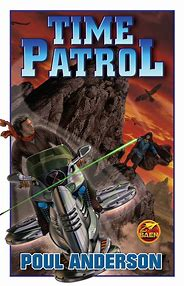Now compare Poul Anderson's Time Patrol. First, Patrol agents live for indefinitely prolonged lifespans - like the whole human population of an interstellar civilization in Anderson's World Without Stars. Secondly, for the period, 1850-2000, the Patrol has only three main offices which all exist 1890-1910, communicating with sub-offices either by small message shuttles or by physical visits. It follows first that an agent could spend a very small part of his working life in any one of those three main offices - or even in all three although paradoxes like meeting yourself or knowing your own personal future are avoided - and secondly that someone somewhen has records of all the business conducted in all three offices. If an agent is recruited in the mid-twentieth century and sent to start work in 1890, then someone at the time of his recruitment can have records of all the Patrol business conducted in that office for the entire period of its existence and also of all Patrol movements back and forth through time in the longer period, 1850-2000. This is strange to say the least and makes life in the Time Patrol qualitatively different from any other human experience. Manse Everard says at one point that they always have problems to deal with but there is no "always." There is a perspective from which all the work of the Patrol has been completed and Everard as a recruit or trainee might meet someone who has that perspective.

3 comments:
Kaor, Paul!
Ugh, trying to make sense of time travel is really hard work! (Laughs) All the more credit to Anderson and you for trying.
Ad astra! Sean
Especially -repetitive- time travel. One-off, it's not too hard.
Kaor, Mr. Stirling!
I agree! To keep a linked series of time traveling stories as interesting as PA manages with the Time Patrol "universe" was a real achievement of artistic genius.
Ad astra! Sean
Post a Comment